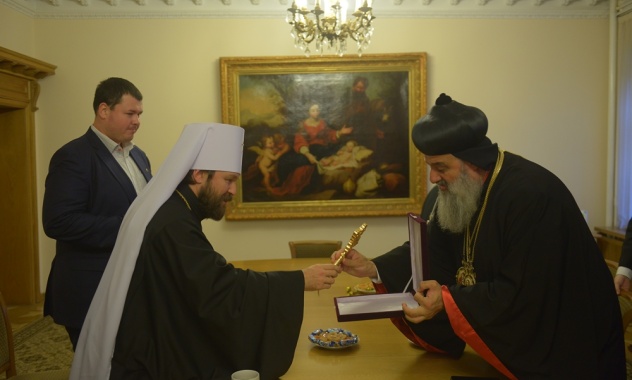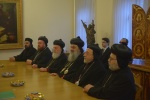DECR chairman meets with Patriarch of the Syriac Orthodox Church
On 10 November 2015, Metropolitan Hilarion of Volokolamsk, chairman of the Moscow Patriarchate’s Department for External Church Relations (DECR), met with the head of the Syriac Orthodox Church, His Holiness Patriarch Mor Ignatius Aphrem II.
They were joined in the meeting, which took place at the DECR premises, by the members of official delegation accompanying Patriarch Aphrem II in his visit to the Russian Orthodox Church: Mor Severius Hawa, Metropolitan of Baghdad and Basra; Metropolitan Mor Dyonisius Jean Kawak, Patriarchal Assistant and Director of the Department of Ecumenical Relations; Archbishop Mor Philoxenus Yusuf Cetin, Patriarchal Vicar in Istanbul and Ankara; Mor Nicodemus Daoud Sharat, Archbishop of Mosul; Very Rev. Raban Roger-Youssef Akhrass, Director of the Syriac Studies Department; Very Rev. Raban Joseph Bali, Patriarchal Secretary and Syriac Media Office Director.
Taking part in the meeting on behalf of the Russian Orthodox Church were also hieromonk Stefan (Igumnov), DECR secretary for inter-Christian relations, and Mr. Sergei Alferov, a DECR staff member.
Metropolitan Hilarion warmly welcome the high guest and his suite and noted that it was the first for over a quarter of a century visit paid by the head of the Syriac Orthodox Church to Russia. Metropolitan Hilarion told the guests about history and the current work of the Department for External Church Relations and about the process of spiritual revival going on in the Russian Orthodox Church during the last decades. Patriarch Aphrem II was interested in the development of church life in Russia, including the work of the educational institutions. Earlier that day the delegation of the Syriac Orthodox Church visited the St. Tikhon Orthodox Humanitarian University. Visits of the delegation to the Ss Cyril and Methodius Institute of Post-Graduate Studies and to the Moscow Theological Academy.
The participants in the meeting discussed the persecution against Christians in the Middle East and the actions the Russian Orthodox Church takes in their defence. Metropolitan Hilarion noted: ‘I well remember my address at the UN several years ago. My words about the facts of persecution were not taken seriously. We all remember that the international community maintained that countries of the Middle East will have democratic reforms after the change of regimes. Yet there was no democracy, but instead terrorists have come with whom it is very difficult to fight. But at all events they must be stopped – there is no other way out.”
His Holiness Patriarch Mor Ignatius Aphrem II expressed gratitude to the Russian Orthodox Church and the Russian people for the assistance they are rendering to the persecuted Christians and underscored that people in Syria and Iraq lay their hope for the re-establishment of normal life in their countries on Russia.
Also discussed were prospects of the dialogue between the Russian Orthodox Church and the Ancient Oriental Churches.
Other events
-
13.11.2015 23:34Head of Syriac Orthodox Church completes his visit to Russia
-
12.11.2015 02:07Patriarch of Syriac Orthodox Church meets with Russia’s Minister of Foreign Affairs Sergey V. Lavrov
-
10.11.2015 21:51His Holiness Patriarch Kirill meets with Patriarch of the Syriac Orthodox Church
-
10.11.2015 20:03DECR chairman meets with Patriarch of the Syriac Orthodox Church
-
09.11.2015 09:12Head of Syriac Orthodox Church arrives in Russia






























